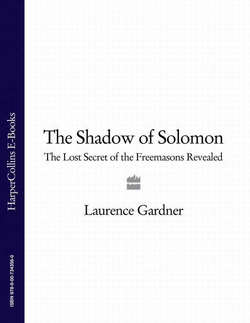Читать книгу The Shadow of Solomon: The Lost Secret of the Freemasons Revealed - Laurence Gardner - Страница 21
4 Legacy of Invention The Georgian Movement
ОглавлениеPrior to James Anderson’s mention that key masonic documents had been lost and destroyed, this was also stated to have been the case in 1718. George Payne, an early Grand Master of the premier Grand Lodge asked his members to bring whatever old literature they could find, so as ‘to shew the usages of antient times’. But it was subsequently recorded that the more valuable manuscripts were ‘tragically lost’. Anderson noted particular examples in his revised 1738 Constitutions, stating that papers ‘writ by Mr Nicholas Stone, the Warden of Inigo Jones, were too hastily burnt by some scrupulous Brothers, that those papers might not fall into strange hands’. The question has recently been posed in the journal Freemasonry Today: ‘Could it be that there was a ritualistic form of Accepted Freemasonry prior to 1717 that was unpalatable to those who wished to review the movement in the 1720s?’1
The answer to this would appear to be ‘yes’. Everything points to the fact that speculative Freemasonry in England prior to Hanoverian intervention was not a role-playing organization as evolved from the dining clubs in 1717. It was concerned with matters that required scientific or technical qualification or experience. Such things would have been foreign to many, and generally unpalatable to the emergent Grand Lodge masons of the London group. It is impossible to discover precisely what these new members did as a cohesive unit outside of performing rituals in their tavern rooms. But in view of the benevolent reputation that evolved, it is likely that they established a Box Club to cement the aspect of mutual support. This was a custom of the old trade guilds, whereby contributions were made into a central pool for the benefit of less fortunate members. The welfare of ‘poor and distressed Freemasons’ and the support of their immediate relatives, including widows and orphans, is still a major concern today.
Irrespective of the new-style Freemasonry, the Royal Society prevailed into Hanoverian times, and thence after Queen Victoria’s death into the Edwardian reign of Saxe Coburg-Gotha—the Germanic house of Victoria’s consort, Prince Albert, that was obliged to change its name in 1917. After the accession of Victoria’s grandson King George V in 1910, World War I was looming, and people began to believe there was a German fifth column in Britain. Notwithstanding the immediate royal family with its roots in Hanover, shopkeepers and business people of German extraction—even the Lord of the Admiralty, Louis Battenberg—found themselves at the wrong end of public opinion. By 1917, with the war well under way, the situation was so bad that King George changed his Saxe Coburg-Gotha family name to Windsor (in allusion to the royal castle in Berkshire). At the same time, Lord Louis changed his Battenberg of Hesse name to the more English-sounding Mountbatten.
Through all this, the Royal Society pressed on regardless, and today remains one of the world’s foremost scientific institutions. But things did change after 1688, and more especially after 1714 when the enthusiastic flair of the early pioneers was subsumed by a more austere Georgian regime.
